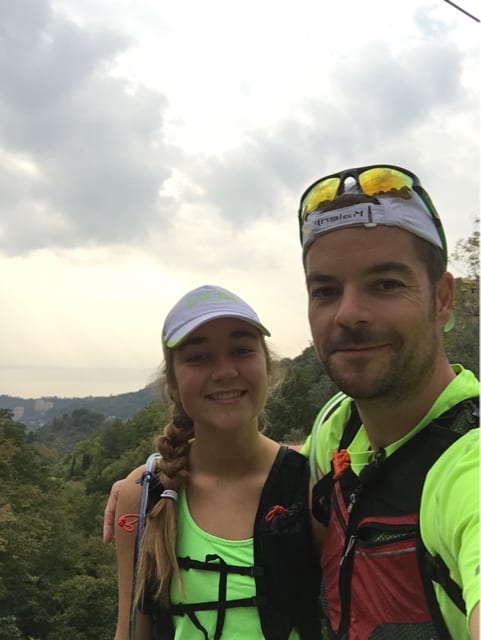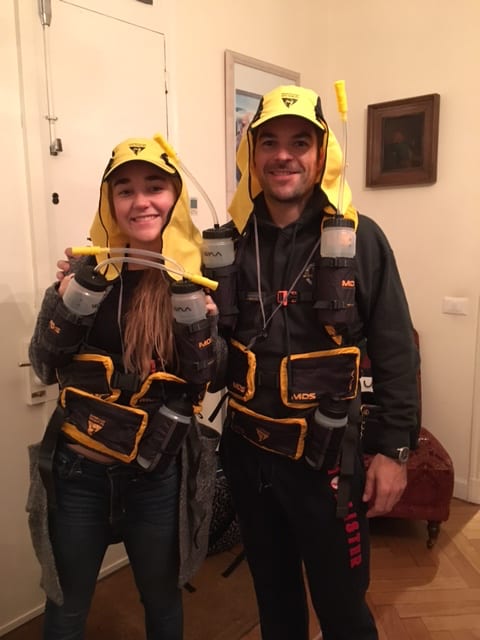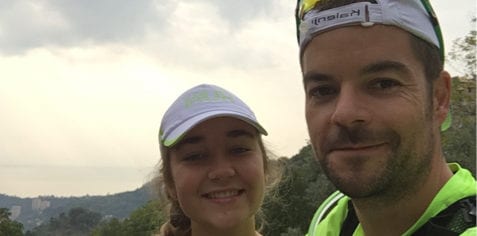
In November 2003, aged 31, Ben Rolfe had just moved to the Principality when the Monaco Marathon ran past his doorstep. At the time, Ben weighed 108 kilos and was “doing my best to eat and drink my way through the doctor’s warning that I would not see 40 at the current rate of progress”.
Over the last 14 years, Mr Rolfe, now 35 kilos lighter, has established himself as a serious ultra-marathoner, completing the Ultra-Trail du Mont-Blanc and Western States 100, amongst other races.
He also contributes to the local community, bringing a team – “Pussyfootingaround”, named after his blog – to compete in No Finish Line, the 24-hour, 8 day run that takes place every November in Fontvieille. This year they completed 6010 kilometres raising €6010 for charity.
Mr Rolfe has penned his journey from “fatty to fitty and the power of the mind” in the autobiographical “Running High, Running Low, Running Long” (UK: New Generation Publishing). “Having changed my own lifestyle,” Mr Rolfe explained, “I hope my story will encourage and inspire others to get off the couch and get outside.”
Mr Rolfe’s story cannot help but inspire. In 2013, hit with life-changing news that his 11-year-old daughter, Alice, was diagnosed with Type 1 Diabetes, he decided to undertake his toughest challenge yet: to prove to her that anything was possible. He decided to run the regional 130-kilometre Cro-Magnon, from Limone Piemonte to Cap d’Ail, aller-retour for a total of 260 kilometres, to raise money for Diabetes UK.

The race is divided into six individual stages, the shortest, on the last day, being 10km while the longest stretch is between 90 to 100 kilometres. “While we trek across dunes, salt lakes, slate fields, wadhis and ergs,” Ben told Monaco Life, “we will have to carry everything we need on our back for the whole week, save for water and the Berber Tent that we will be sleeping in at night. Our packs will weigh something like 12 kilos once we have amassed the necessary food, clothing, emergency medical equipment, sleeping bag and so on for the week.”
So far, the Dad and daughter duo are putting in 70 km per week, training with packs on, and this will increase as they get closer to the event itself – “once we stop arguing over the flavours of the dehydrated foods we are going to take”.
“As you can imagine, our relationship has been at times ‘stretched’,” Ben shared, “but overall the shared experiences and hardships have forced us together in a way that it is impossible to explain. I hope that this is true of the race itself!”
Team Rolfe are trying to raise £19,500 to help Diabetes UK fund the cost of “a new and very fancy piece of technology” – a combined transmitted light and fluorescent microscope and an imaging computer, to enable their team of research scientists to study kidney cells and find new ways of treating kidney disease. Some thirty percent of Type 1 diabetics develop kidney disease and as many as forty percent of Type 2 diabetics.
The machine costs £23,500, but with Diabetes UK having already raised £3,500, £19,500 is needed. This is where Mr Rolfe and Emily come in, and they’ve set up a donation link at JustGiving.
Managing diabetes is a 24/7 job, and the consequences of getting it wrong are severe – blindness, amputations, premature death. Diabetes management currently costs the NHS £60 billion a year, and that number is growing. It’s estimated that the number of people with diabetes of all types in the UK will increase from 4 million to 5 million in eight years time, a figure equivalent in France and other Western countries.
“Diabetes UK helped us enormously with the practical, mental and emotional aspects of the condition,” Mr Rolfe said. “With their ongoing help and education we – and especially Alice – are able to take control of diabetes, and not the other way around.”
Read more about the Rolfe family’s running adventure.
Article first published January 23, 2017.
